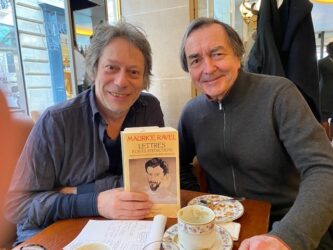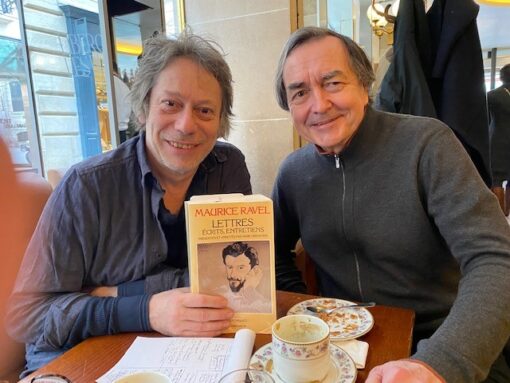 United Kingdom Ravel: Pierre-Laurent Aimard (piano), Mathieu Amalric (speaker). Queen Elizabeth Hall, London, 27.3.2025. (MB)
United Kingdom Ravel: Pierre-Laurent Aimard (piano), Mathieu Amalric (speaker). Queen Elizabeth Hall, London, 27.3.2025. (MB)

Ravel – Jeux d’eau and Valses nobles et sentimentales (excerpts); Le Tombeau de Couperin: ‘Prélude’, ‘Forlane’, ‘Toccata’; Miroirs: ‘Noctuelles’, ‘Alborada del gracioso’, ‘La Vallée des cloches’; Gaspard de la nuit
Presented more as show than a recital, it was nevertheless the musical elements of this Queen Elizabeth Hall celebration of Ravel that shone through. The conceit did no harm; for one thing, it was a welcome opportunity to see Mathieu Amalric on a London stage. He took the part of a friend of Pierre-Laurent Aimard, calling to collect him to travel to a recital Aimard would be giving. Whilst Aimard did some last-minute practice – or rather played around with other music by Ravel – Amalric read from material with which his friend had helped inform him and also filmed him. The script could have done with more work, to be honest, but it did not get in the way; the warmth of their collaboration was evident.
And so, when the lights went down, the music began. Aimard’s selection of sheet music from the floor – we have all been there – and (very superior) busking through a few bars of Jeux d’eau, followed by excerpts from Valses nobles et sentimentales offered a winning amuse gueule, though naturally one wished to hear more, whilst retaining a sense of eavesdropping on practice. Then the doorbell rang: enter Amalric. He suggested that Aimard play the ‘Epilogue’, which served to cast a nostalgic shadow even over music we had not heard, lilt and voicing delectable.
Other readings followed, interspersed with music: Ravel writing to his mother in 1916 with a wounded reproach that he had not heard from her, another letter from the same year on ‘active duty’ opposing ‘patriotic’ efforts to prohibit performances of enemy music, such as that of Schoenberg and Bartók. The three movements from Le Tombeau de Couperin certainly gained something from enhanced awareness of their wartime context, as did the three from Miroirs from a 1905 letter to Maurice Delage, its talk of ‘smelting castles’ and the ‘wonderful symphony’ of their sounds nice preparation for the beauty in precision of ‘Noctuelles’ as composition and performance. Talk from another source of the cliché of Ravel’s Spain as more real than the real thing could momentarily be believed, in the Lisztian virtuosity of ‘Alborado del gracioso’, not least its exultant close. The more mysterious, even mystical realm of ‘La Vallée des cloches’ gave a sense of French music to come, Messiaen, even Boulez, heard at a different aural temperature, which paved the way for Gaspard de la nuit.
This was the concert ‘proper’, a performance that reminded me, among other things, how infrequently we hear this masterpiece. Why? Perhaps pianists still shy away from its demands or only have it in their repertoire for a while. One can hardly blame them. At any rate, it was a treat from beginning to end chez Aimard. The unmistakeable shimmering of ‘Ondine’ registered with a freshness that, just maybe, had some roots in the novelty of presentation as well as in the excellent pianism and musicianship. Aimard’s wondrous spinning of a musical line, unfailingly eloquent, revelled in the Bösendorfer and its sound world. The terrifying yet somehow seductive insistence of ‘Le Gibet’ was heard at proper ‘temperature’ too, as if the myriad repeated notes throughout the evening had been leading here. ‘Scarbo’, his laughter and shadows, could be seen as well as heard, a still more fitting culmination with roots in all that had gone before. Had I not seen Aimard’s two hands with my own eyes, I might have sworn he had four.
Mark Berry

Oh, it was completely wonderful, wasn’t it? I was blown away, especially Gaspard de la nuit and completely agree with all your observations.